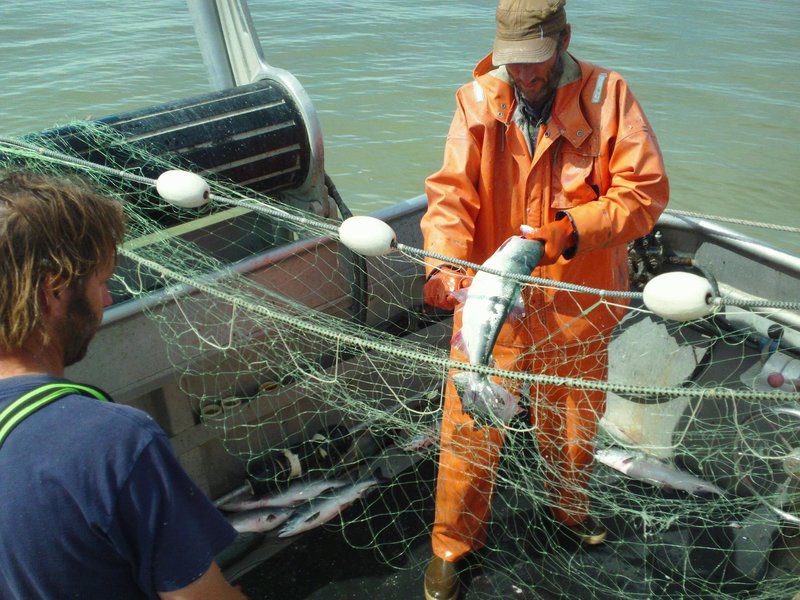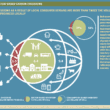Editor’s Note: The following story first appeared in The Maine Monitor’s free environmental newsletter, Climate Monitor, that is delivered to inboxes for free every Friday morning. Sign up for the free newsletter to get more important environmental news from reporter Kate Cough by registering here.
A few years ago, while working as a beat reporter for The Ellsworth American, I wrote a story about a fisherman from Machias named Chris Mullen. For the past three decades, Mullen, alongside his brother Jonathan and occasionally his son, Wolf, has taken off each spring for the port town of Dillingham, Alaska to catch the roughly six-week run of the world’s most productive salmon fishery.
The men, crammed into the hold of a 32-foot Bristol Bay gillnetter, fish up to 20 hours a day, hauling in sockeye salmon (the smaller, more brilliantly-colored cousin of its Atlantic brother) to sell to tenders in Alaska and to bring home to Maine, where the family delivers it both to wholesalers and to homes around Hancock and Washington Counties.
Mullen fishes for salmon in Alaska because he can’t catch them in his home state: by the time he started fishing, in 1987, Atlantic salmon were already threatened in Maine. They would be declared endangered not long after.
Once native to almost every coastal river northeast of the Hudson, the glittering schools of “The King of Fish” began disappearing in the early 20th century. Dams, pollution, and overfishing reduced their population size until the fisheries eventually closed in 1948. Commercial and recreational fishing for wild sea-run Atlantic salmon is banned in the United States; all Atlantic salmon in the public market is cultured and commercially grown.
Which brings us to today. Despite the collapse of the wild Atlantic salmon fishery, salmon remains one of the country’s most popular seafood products: Americans eat more of it per-capita (3.1 pounds in 2019) than any seafood other than shrimp. Most of that is imported, primarily from Chile, Canada and Norway, but more and more companies in the U.S. are looking to get in on the farmed salmon game — it was the leading species for finfish aquaculture in the country in 2020, at an estimated 31.9 million pounds.
As you likely know by now, several of those companies are in Maine, or at least they’re trying to be. Making our way up the coast from west to east, here’s a brief primer on the four major fish farms wading through the regulatory process and where things stand today.
Belfast: Nordic Aquafarms wants to raise more than 60 million pounds of salmon a year at a $500 million land-based facility on the Little River. Opponents have been fiercely fighting the proposal since its announcement four years ago, but with the company seems to be on the verge of actually getting construction underway after closing in March last month on 54 acres of land off Route 1, according to the Bangor Daily News. Construction could begin within the next year, although the company is still facing a number of legal challenges.
Bucksport: About a half-hour drive to the east, Whole Oceans, which also plans to farm salmon in land-based tanks, said it will move forward with site work this spring on $250 million facility at the former Verso paper mill. The project was announced around the same time as the one in Belfast but has not faced nearly the same opposition from local residents or officials. It has permits to farm about 44 million pounds of fish annually, which Senior Project Manager Mike Thompson told SeafoodSource in March is “still the vision. That’s what we’re approved for with our waste discharge license and we think the site is well-suited for that. So that’s the target that we’ll be working towards, and all the plans that we’re working on … are directed towards that goal.”
Gouldsboro: And then there’s American Aquafarms. Two years ago, the company put forward plans to raise 66 million pounds of Atlantic Salmon in enclosed floating pens in Frenchman Bay, off the town of Gouldsboro, an hour east of Bucksport. The proposal encountered strong opposition from the outset. The company ran up against a significant hurdle in late April, when both the Department of Marine Resources and the Maine Department of Environmental Protection terminated two lease applications. The former was rejected because the company failed to furnish an “available source” of juvenile fish; the latter because the Department of Marine Resources application was then no longer pending. But American Aquafarms has signaled it plans to stay in the area and keep trying: despite the setbacks, it closed last month on the former Maine Fair Trade Lobster processing plant for $3.64 million, and has also appealed the termination decision. “We’re not going anywhere,” company spokesman Tom Brennan recently told The Ellsworth American. “We believe we have good technology, plans for a state-of-the-art facility and that the project will bring significant economic opportunity to the region and to the state.”
Jonesport: Farther downeast, in the fishing village of Jonesport, Kingfish Maine is inching closer to getting final permits from the Army Corps of Engineers and the Jonesport Planning Board to grow yellowtail kingfish in land-based pens. The fish are found in the wild primarily in temperate waters of the southern hemisphere, and are often eaten as sashimi. Kingfish Maine has faced a chorus of concern, in particular from lobstermen and locals worried about water quality in Chandler Bay. As with other land-based designs, the tanks would draw in water from the bay, filter it and discharge it back into the sea. Kingfish Maine would release 29 million gallons per day. Despite opposition, the company is moving forward with plans, and recently received its first shipment of fish (they’re being housed at the University of Maine’s Center for Cooperative Aquaculture Research in Franklin). Officials recently told Spectrum News Maine they plan to break ground by the end of the year.
In the midst of all of this, researchers and officials at all levels are trying to figure out where aquaculture fits with Maine’s other aquatic industries, from lobstering to tourism, and how it can be managed sustainably going forward.
“How do we thread this needle,” asked host Ron Lisnet on a recent episode of The Maine Question podcast, a project of the University of Maine, “feeding the growing demand for seafood, saving the resource and the environment where they grow?”
To read the full edition of this newsletter, see Climate Monitor: something fishy.
Kate Cough covers climate change and the environment for The Maine Monitor. Reach her by email with ideas for other stories at kate@themainemonitor.org.





